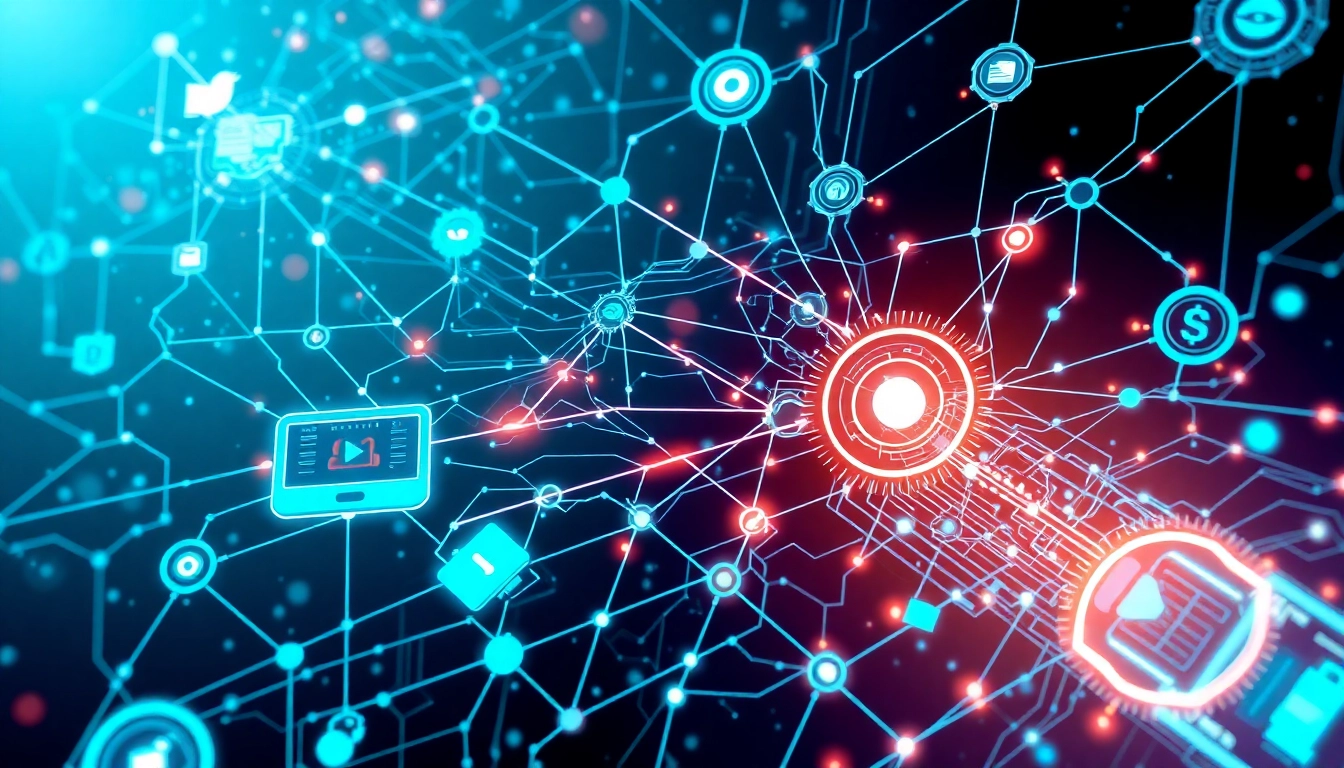The Basics of Technology
Defining Technology in Today’s World
Technology is a multifaceted term that encapsulates various fields and disciplines focused on the creation and utilization of tools, machines, and systems that enhance human life. At its core, technology can be defined as the application of scientific knowledge aimed at achieving practical ends. This includes everything from information technology (IT) systems that assist businesses in managing data, to medical technologies that improve patient care. As we navigate the complexities of modern society, understanding technology’s role is imperative for ongoing progress. For a more thorough exploration of technology, we delve into its definitions, implications, and transformative potential.
Historical Overview of Technological Advances
From the invention of the wheel to the rise of the Internet, humanity’s history is deeply intertwined with technological advancements. Initially, technology was primarily concerned with tools that facilitated everyday tasks. However, as societies developed, so did the complexity and capability of technology. The Agricultural Revolution was one significant early phase, marking humanity’s shift to farming and settled communities. The Industrial Revolution of the 18th and 19th centuries brought profound changes, transforming economies from agriculture-based to industry and manufacturing-focus. Each successive technology wave has yielded richer, more efficient systems that have underpinned our era today.
The Role of Technology in Everyday Life
In today’s fast-paced world, technology permeates every aspect of our lives. From the smartphones we use to communicate, to the smart appliances that automate everyday chores, technology enhances efficiency and connectivity. Employers leverage technology for better workforce management, and educational institutions rely on tech solutions to improve teaching and learning experiences. Moreover, technology is reshaping industries like transportation, health care, finance, and entertainment. Understanding its implications is crucial to harnessing its full potential, ensuring that technology serves to improve our standard of living.
Types of Technology
Information Technology: The Backbone of Modern Business
Information technology (IT) has become the cornerstone for business in the modern age. IT encompasses the use of computers, networks, software, and databases to process and manage data. This sector enables businesses to make informed strategic decisions through data analytics, optimize operations through enterprise resource planning (ERP) systems, and connect with consumers via digital platforms.
The rise of cloud computing has transformed IT, allowing businesses to scale their infrastructure without substantial investment in physical systems. Companies using IT solutions can improve customer satisfaction through personalized services and targeted marketing. Additionally, remote work technologies have propelled productivity across various sectors, highlighting the indispensable role of IT in modern business landscapes.
Biotechnology and Its Impact on Healthcare
Biotechnology, the application of biological systems and organisms in technology, has a profound impact on health care and medicine. It encompasses a wide array of fields including genetics, molecular biology, and biochemistry, offering innovative solutions to chronic disease management, drug development, and diagnostics.
Some of the most significant advances in biotechnology include the creation of genetically modified organisms (GMOs) for food production, personalized medicine that tailors treatments based on individual genetic profiles, and groundbreaking therapies such as CRISPR that allow for gene editing. The implications of these technologies are vast, promising to enhance health outcomes for millions while also raising important ethical considerations regarding genetic manipulation and bioterrorism.
The Rise of Green Technology in Sustainability
As environmental concerns continue to mount, green technology emerges as a critical area aimed at reducing environmental impact and promoting sustainability. Green technology refers to innovations that are environmentally friendly and promote the conservation of natural resources. This includes renewable energy sources such as solar, wind, and hydropower, as well as innovations in battery technology and carbon capture solutions.
The importance of green tech is underscored by initiatives aimed at combating climate change and reducing carbon footprints. Businesses are increasingly adopting sustainable practices not just for compliance reasons but also for consumer preference towards eco-friendly products. Emerging green technologies hold the potential to reshape energy consumption patterns, reduce waste, and offer viable solutions to global resource challenges.
Challenges in Technology Implementation
Common Barriers to Technology Adoption
Despite the advantages that technology brings, the path to implementation often encounters significant roadblocks. Financial constraints, inadequate infrastructure, and lack of skilled workforce remain common barriers, particularly in developing regions. Organizations may also struggle with resistance to change among employees who are accustomed to traditional processes.
Effective change management strategies should be prioritized to mitigate resistance. This can involve training programs to upskill employees, transparent communication regarding the benefits and necessity of technology adoption, and phased implementation strategies to ease the transition. Moreover, businesses must ensure that they have the budget and resources to support the adoption of new technologies effectively.
Security Risks and Cyber Threats
With the rise of technology comes the heightened risk of cyber threats and security vulnerabilities. Organizations increasingly rely on digital systems, leaving them exposed to potential breaches that can compromise sensitive data. Cybersecurity has thus become a fundamental aspect of technology deployment.
It’s crucial for organizations to implement robust cybersecurity measures, including encryption, firewalls, and regular system updates. Conducting comprehensive risk assessments and fostering a culture of security awareness among employees can significantly mitigate these risks. Emerging technologies such as artificial intelligence and machine learning are also being leveraged to enhance defensive capabilities against cyber threats.
Bridging the Technology Gap Across Societies
The digital divide exists, creating disparities in technology access and use among different communities and populations. Addressing this issue is pivotal, not only for ensuring equality but also for maximizing the potential benefits of technology. Many individuals, particularly in developing regions, lack access to basic technological infrastructure such as reliable internet and digital devices.
Governments and organizations must collaborate to provide universal access to technology. Initiatives could include subsidizing internet services, investing in digital literacy programs, and offering free or affordable online resources. Bridging the technology gap promotes inclusivity, ultimately enriching societies with diverse perspectives and ideas.
Emerging Trends in Technology
The Role of Artificial Intelligence
Artificial intelligence (AI) is among the most transformative technological trends today. Its ability to analyze data, automate processes, and simulate human intelligence is revolutionizing various sectors. From personalized marketing to predictive analytics in healthcare, AI is driving innovation and efficiency.
Furthermore, AI applications, such as machine learning and natural language processing, are enhancing capabilities in areas such as customer service through chatbots, optimizing supply chain management, and even contributing to advancements in autonomous driving technology. Ethical considerations regarding the use of AI, particularly concerning job displacement and decision-making biases, must be carefully evaluated as we adopt this powerful technology.
Virtual Reality and Its Transformational Impact
Virtual reality (VR) is an immersive technology that allows users to interact with a simulated environment. Traditionally associated with gaming, VR has found applications across multiple industries, including education, training, healthcare, and real estate. Its ability to provide experiential learning environments is particularly beneficial in training professionals in high-risk fields such as medicine and aviation.
Additionally, VR can enhance consumer experiences in retail settings, allowing customers to visualize products in a virtual space before making a purchase. As the technology continues to evolve with significant advancements in hardware and software, the boundaries of virtual reality applications are bound to expand further, potentially revolutionizing the way industries operate.
Blockchain Technology and Its Future
Blockchain technology represents a disruptive force across various sectors, most notably finance. It offers a decentralized method for storing and securing data that promotes transparency and trust. The implications of blockchain extend beyond cryptocurrencies; it is poised to reshape supply chains, identity verification, and secure transactions in multiple domains.
As industries increasingly adopt blockchain solutions, the potential for innovation appears boundless. Organizations are experimenting with smart contracts, which automatically execute agreements when predefined conditions are met, facilitating transparency and efficiency. However, the regulatory landscape for blockchain remains under development, which may pose challenges as the technology scales in adoption.
The Future of Technology
Predictions for the Next Decade
Looking ahead, technology is projected to continue its rapid evolution, with a few key trends likely to shape the next decade. We anticipate significant developments in areas like AI, robotics, and biotechnology, pushing the boundaries of what is currently possible.
Moreover, advancements in connectivity through the expansion of 5G networks promise to enhance real-time data processing and interconnectivity across devices. This paves the way for innovations like smart cities, where infrastructure uses real-time data to improve urban living. Sustainability will also emerge as a key focus, driving tech advancements towards eco-friendly innovations.
Preparing for Societal Changes Driven by Technology
The impact of technology extends beyond the technical realm, influencing societal structures, work culture, and human interaction. As automation increases in workplaces, there will be critical discussions about job displacement and workforce re-skilling. It becomes essential for governments and organizations to prepare through comprehensive training and education programs that align with the evolving job landscape.
Moreover, as technology continues to transform communication, societal dynamics will shift, necessitating effective strategies to manage impacts on mental health, privacy, and civic engagement. Proactive measures can help societies leverage the benefits of technology while mitigating adverse effects.
The Ethical Considerations in Technological Growth
With every technological advancement comes a suite of ethical considerations. Issues regarding data privacy, surveillance, and the potential for misuse of technology must be grappling with as innovations proliferate. From ethical AI implementations to navigating the moral complexities of biotechnology, addressing these issues at the early stages of innovation is imperative.
Ethical frameworks and guidelines are essential for steering technological growth in a direction that respects human dignity, promotes equity, and enhances social welfare. Stakeholders across sectors—governments, businesses, and civil societies—must collaborate to establish norms that guide technology’s role in society responsibly.



